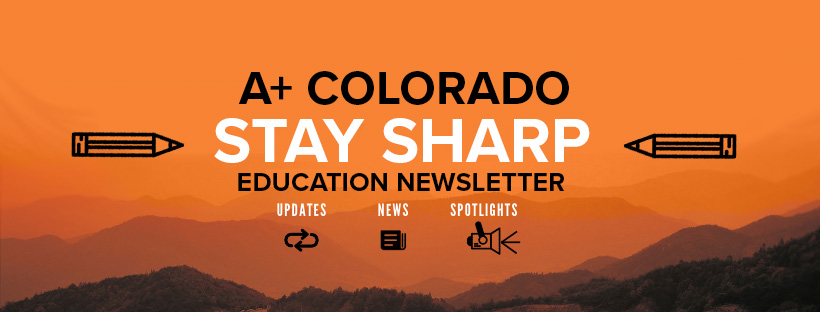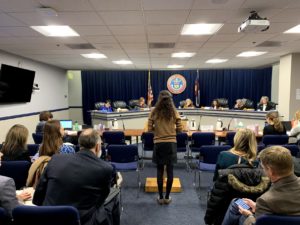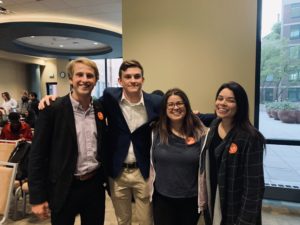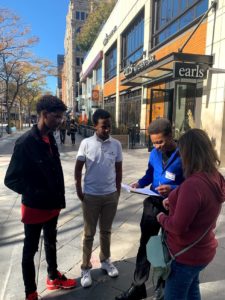As leaves fall, snow accumulates and ballots drop, you can continue to rely on A+ Colorado to provide meaningful and relevant updates. This newsletter features updates on the upcoming school board election in DPS and Aurora, a look into implications from Denver’s SPF, and did we mention it’s #NationalPrincipalsMonth? Make sure you #ThankAPrincipal today.
A+ Updates
1 Week Until November Election – Will You Vote?
Ballots began hitting mailboxes in October. A+ Colorado believes it a crucial to vote in these elections as they decide who will serve on our School Board. Those elected will help decide where and how money is spent within the district, which ultimately impacts our teachers, students and their learning outcomes.
Your vote matters. Get up to speed with all things related to Denver and Aurora School Board Elections. The Denver resources help break down some of the demographics, academic performance, and student outcomes in each area of the city with an open seat. The Aurora resource looks at similar information for Aurora Public Schools, a district serving nearly 40,000 students.
Tune in on election night online on The Denver Channel where Van Schoales will join Anne Trujillo for live election coverage.
Last month, A+ Colorado President, Van Schoales had the pleasure of moderating a discussion on the “Teaching of Empathy” at the Denver Biennial of the Americas. It was a powerful reminder that the heart of teaching begins with empathy.
The Clinica was titled How to Build a Better World: Teaching Empathy Inside and Outside the Classroom. It included leaders that were classroom teachers, teacher trainers, and school district leaders. Read about the discussion here and Van’s takeaways here.
Join the A+ Team!
A+ is hiring an Advocacy Director! We are looking for a new teammate who is as passionate about improving public education in Colorado as we are. See the job description and submit an application here.
News to share
Raising the Bar for Performance Schools
After more than a year of staff time and discussion, the State Board of Education made changes to the overall cut points of the school performance frameworks for elementary and middle schools, raising the bar for schools to receive a “Performance” rating, the state’s highest rating. The decision was prompted by statutory requirements to add a growth-to-standard measure, and the perceived disconnect of an accountability system that rated 72% of schools with the highest rating while 45% of students met grade level expectations in core academic subjects.
A+ Colorado submitted a letter and provided public comment on the issue. We strongly support a system that better aligns school and student performance. We also support a school accountability system that better differentiates schools and district performance to help communities, educators, and policymakers understand where we could look for best practices, as well as be clear about how far our system has to go to truly support every student. To that end, we advocated for raising the bar for “Performance” schools. (The names of rating categories are convoluted and unhelpful for the public, but that’s another day’s battle).
Public comment on the issue lasted a full hour and demonstrated a stark disagreement in the theory of action of an accountability system. Some superintendents, local school board members, and educators spoke to the demoralizing effect raising the bar would have on schools such that more schools would be rated as “Improvement,” a rating that indicates that, while the school is not struggling to support students to the same extent that schools on the accountability clock are, not enough students in the school are meeting grade level expectations or making enough growth.
Here is where we disagreed: at A+ we believe that increased transparency around the variance of student outcomes in schools helps families and educators alike to identify best practices and have conversations about how schools can best support students. Educators, policy makers and the public must be able to identify what is working and pinpoint schools that are struggling so that appropriate interventions can be made including but not limited to increased resources. This echoed many others in the room. “In Colorado, we owe it to our families across the state to paint a picture of our schools that is honest about areas the school still needs support and additional resources” said Ariel Smith, co-founder of TEN. Anne Keke, a parent in Aurora said “honesty is the best policy. The state needs to be honest with parents, and with communities.”
Where we agree with nearly all of the public comment regardless of where the bar is set is the value of growth. We must know which schools are best supporting students regardless of what academic level they enter the school, and that students are making progress toward mastering academic content. Growth is less correlated to student characteristics than overall achievement and provides a better understanding of the impact of schools on student learning over the course of a year.
We are pleased to see Colorado continue to value growth as a key indicator for school accountability, and we believe that the state must be more transparent about both the data that contributes to the accountability system, and information about how schools support students.
October is #NationalPrincipalsMonth
A+ believes great school principals are critical in the development and improvement of an effective school. For National Principal’s Month, we are re-sharing a piece from John Youngquist, one of the former leaders of the Denver principal pipeline, and now principal of East High School. In his blog, John calls on Denver Public Schools to examine why high school principal turnover is so high and what might be done to better support secondary principals. Read Where Have All the Principals Gone? A Principaled Perspective, and don’t forget to go out and #ThankAPrincipal today. They deserve it.
Implications of the 2019 DPS SPF on School Replications
Denver’s latest School Performance Ratings (SPF) were released a few weeks ago. The SPF provides a synthesis of a great number of data points to get a general sense of the academic gains and achievement of students in the last two years. You can see deep research in our recent Denver’s Next Journey: Measuring and Communicating Good Schools and review still relevant musings about the SPF’s purpose, design and function in our blog posts.
Perhaps one of the most important takeaways from this year’s results is the implication for replications of existing schools. Board resolutions approving new schools (including district-run, innovation, and charter schools) state that in order for those schools to open new campuses “the organization’s existing campus(es) at the same grade configuration shall continue to meet or exceed performance expectations on the SPF.” Three operators with schools on the shelf, DSST (middle and high schools on the shelf), Rocky Mountain Prep and University Prep (both with elementaries on the shelf), per the performance condition, cannot open the new schools because they all are operating at least one school that was not Blue or Green on the 2019 SPF.
There are some school replications that are still viable, if there were facility availability and a community chose the school. Beacon schools, an innovation zone, both were rated Green, and have approved middle schools on the shelf. STRIVE could open one of the elementaries it has on the shelf because its only elementary school (Ruby Hill) is green, though several of its middle and high schools were rated Yellow, Orange, and Red, so it is unclear if there would be a strong case to do so.
We are pleased to see that the intent Denver’s performance condition for school replication is working. Schools and networks should be replicated only when they have demonstrated family demand and high quality in all of their existing schools.
Students Ask Denver Candidates The Tough Stuff
Earlier this month, the A+ team attended a student-led, and student organized School Board Candidate Forum. This forum provided a platform for student voice and perspective as they asked questions to candidates surrounding their motivation for running, and extremely meaningful topics including mental health, school safety, the public school to prison pipeline, and restorative justice. Special thanks to the hosts of the event, Colorado Youth Congress, Padres Y Jóvenes Unidos, Project VOYCE, Denver Public Schools Voice and leadership, and Young Aspiring Americans for Social and Political Activism.
We are thankful to groups like this who work alongside students to be the voice of today’s young leaders. A big shout out to A+ Colorado summer intern Luke Hendricks for his work helping to put this event together.
Denver Schools Lift All Students
In August. A+ Colorado, RootEd, Transform Education Now (TEN), and the University of Colorado Denver’s School of Public Affairs for Denver Schools hosted a room full of 150 community members for Denver Schools Lift All Students.
The event is now online where you can hear from Dr. Macke Raymond from CREDO at Stanford on her recently released research which highlights major findings about the academic performance of students in Denver. You will also be able to hear from Denver Public Schools Superintendent Susana Cordova, Pastor Vernon Jones Jr., Charles Dukes, and the community as they reflected on these findings.
Watch the full event here.
A New Education Funding Formula on the Horizon?
The School Finance Legislative Interim Committee has been meeting for three years to review and propose changes to how Colorado funds schools, a formula that was developed in 1994. There seems to be movement after two bill drafts were proposed. Both bills would look at making changes to some of the factors, like the proportion of at-risk students in the district, the cost of living within and size of the district, that determine how much per-pupil money districts receive.
If ultimately introduced and passed in the legislature, these bills could make some fundamental changes and address the existing “winners and losers” within the system. For example, under current practice, districts receive weighted per-pupil funding for students who qualify for free lunch, but not reduced price lunch. Currently, students cannot be “double-counted” and warrant additional targeted funds if they both qualify for free lunch and are emerging multilingual students. These bills could change these highly inequitable practices by targeting resources to more students whose families are low income, expanding special education funding, and supporting emerging multilingual students who are also low-income. In a zero-sum reality, where districts already face lower revenues than statutorily required due to the budget stabilization factor, there is clear opposition to changing the formula without introducing new revenue. Voters will consider Proposition CC this fall, which would remove the revenue cap currently in place under TABOR to allow the state to retain revenue in strong economic times when more money is generated through current tax rates, rather than return those dollars to taxpayers as current law requires. If passed, the money — projected to be $264.3M in FY20 and $143M in FY21 — would be divided equally between K-12 funding, higher education, and transportation infrastructure.
Community Spotlight: Colorado Youth Congress
Our Communications Associate joined students at the Colorado Youth Congress state-wide summit. Colorado Youth Congress (CYC) trains diverse groups of young people to build stronger communities, and learn what it takes to create systemic change in a complex world. While facilitating discussion, students dove into critical social issues facing the future of Colorado related to homelessness, mental health, structural racism and accessibility. Students also interviewed community members on their personal priorities related to these topics. A+ is thankful for groups like CYC who inspire others and allow an insight into students optimism for the future of Colorado as world-changers who will be leading the state in the near future.
A+ Answers
How are kids doing in Aurora and what should be on our radar going into the elections?
We pulled together some fast facts to quickly understand the current state of Aurora Public Schools and what’s at stake in this election. See the full A+ Answers here.
Upcoming Events
Nov. 7 | A New Foundation for Accountability: What is Quality & Who Decides?
Colorado’s current school accountability system provides insight that is designed primarily for state and federal policymakers. Join us for a day focused on how to reimagine a system built with educators and families as its primary users, while also providing the data that is necessary to inform those responsible for oversight of Colorado’s education system.
Dec. 10 | Save the Date: Colorado Gives Day
Colorado Gives Day is an annual statewide movement to celebrate and increase philanthropy in Colorado through online giving. Donations that go to A+ Colorado will help us continue the work to improve and advocate for better public education for Colorado’s students.
Feb. 21 | Save the date: A+ Sharpen Education Awards
Celebrate with A+ as we honor leaders making bold moves to improve the lives of Colorado students.
A+ In the News
Politics Unplugged: School Funding, The Denver Channel
District, teacher groups urge State Board not to change Colorado school ratings, Chalkbeat Colorado
Fewer Schools To Get High Marks Under New Rating System In Colorado, CBS4
Fewer Colorado schools will get top ranking under new state rules, The Denver Post
Politics Unplugged:Recruiting & Retaining Teachers, The Denver Channel
Want A+ Colorado news delivered to your inbox? Subscribe!




